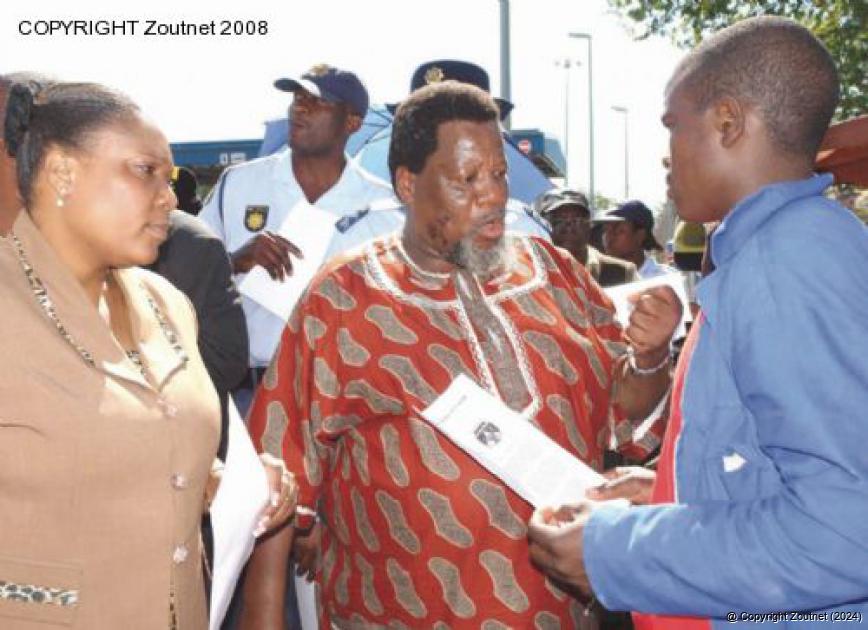
The Speaker of the Limpopo legislature, Dr Tshenuwani Farisani, and the mayor of Musina Local Municipality, Caroline Mahasela (left), assure support to a Zimbabwean national during the anti-xenophobic campaign at Beit Bridge Border Post on Friday. Photo: Elmon Tshikhudo
News - Date: 06 June 2008
Musina Municipality, in conjunction with the Beit Bridge Rural District Council of Zimbabwe, launched an anti-xenophobic campaign at Beit Bridge border post and around Musina town on Friday afternoon, following the ongoing wave of attacks on foreign nationals.
The attacks, which started some three weeks ago in Alexandra township in Gauteng, before spreading to other areas of the Western Cape, have reportedly so far claimed more than 60 lives and left 670 people wounded, while thousands have been displaced across the country. Most of the victims are Mozambicans, Malawians and Zimbabweans.
The anti-xenophobic campaign was characterized by a procession led by the mayor of Musina, Cllr Caroline Mahasela, together with the station commissioner for the Musina Police, Supt Margaret Mathebula, the Speaker of the Limpopo Legislature, Dr Tshenuwani Farisani, and representatives from the Beit Bridge Rural District Council in Zimbabwe.
The delegation moved around the town, distributing anti-xenophobic pamphlets containing a message that denounced violence.
The proceedings started at Mathivha Holdings building, which houses the local constituency office before visiting the high-density suburbs of Freedom Park, Skoonplaas and Nancefield, the CBD. The delegation wound up the tour by visiting Beit Bridge border post, where Dr Farisani addressed the travelers, mostly Zimbabweans.
In his address, Farisani condemned the xenophobic attacks on foreigners and urged South Africans to embrace everyone as fellow African brothers and sisters. "We strongly condemn these xenophobic attacks with the contempt they deserve as they represent a dangerous tendency which is foreign to South African history and consciousness. We should do away with this negative behavior and focus on building a united Africa. People need to put their efforts towards integrating politically, socially and economically, rather than spending time fighting over trivial issues.
"For many decades, South Africans have lived side by side with foreign nationals with no acts of violence. Our laws protect all foreign nationals, whether they are here legally or otherwise, and any violent behavior towards foreigners must be rejected by all," he said.
Farisani also urged perpetrators of violence to stop the attacks forthwith, and warned that the government did not condone the acts of violence. "We are calling on the attackers to lay down their weapons and we urge our communities to inspire confidence, so that solutions are found urgently. It is important for everyone to reject the hate and violence behind the attacks." He also called on the law enforcement agencies to deal with the perpetrators of violence ruthlessly.
Speaking during the same occasion, Cllr Mahasela said people should learn to live together as an African community, irrespective of their nationalities. She said the attacks on foreign nationals were likely to threaten bilateral trade between South Africa and other African countries.
Many Zimbabweans visit Musina daily for shopping and business purposes and, in the process, contribute to the town’s economic boom. It is estimated that there are over 3 million Zimbabweans living and working in South Africa.
Meanwhile, scores of Zimbabweans fleeing attacks arrived at Beit Bridge border post on Sunday (June 1) aboard ten government buses, after the victims had reportedly offered to be assisted in being repatriated to their respective homes.








